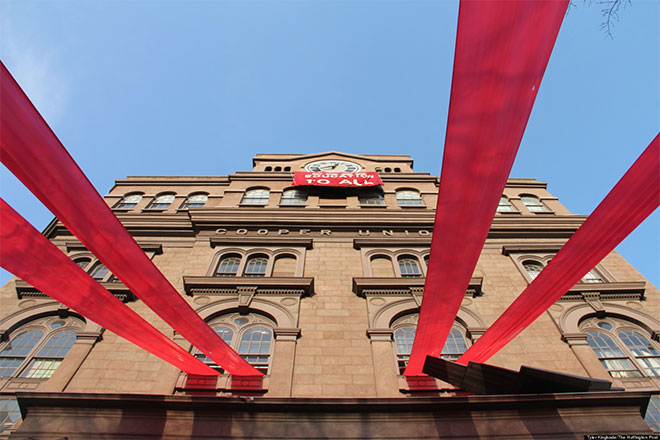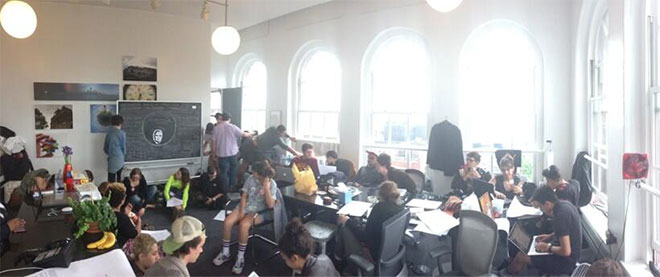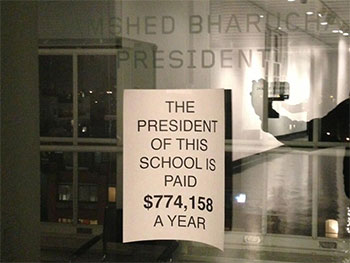A few thoughts on the Cooper Union occupation.

Cooper Union's current student occupation is as unique as the institution itself.
What started 20 (!) days ago as a sit-in protest against CU's impending tuition has now morphed into something entirely different. The very first day of the occupation, the administration threatened to arrest — and possibly expel — any students who did not leave that evening. Students called their bluff, and the big wigs blinked. Now occupiers have been calling the president's office home for more than two weeks straight, complete with delivery meals paid for by supporters, a frequent stream of guest speakers from around town, and even a chocolate cake created in the likeness of the CU's administration building.

Students in the President's office.
Saar Shemesh at {young}ist has a fascinating first-hand look into the nuts and bolts of the occupation:
On May 8 we began to hold the office space, exclaiming that it was “no longer the Office of the President, but an Office for Over 100 Presidents from the Cooper Community.” We chose to occupy the president’s office to show how we could make the space function for the institution better than had Bharucha – literally taking hold of the hub of the administration at Cooper.
I can't emphasize enough what a colossal blunder President Barucha and the Board of Trustees have made in not kicking the students out. They've abandoned one of the most strategic and symbolic spaces on CU's campus, and are seemingly at a loss as to what to do. They clearly didn't learn the lessons that the New School and NYU administrations learned from their occupations several years ago. As told by the New York Times:
Dr. Bharucha has been operating a government in exile from his home and other offices, doing what he can with e-mail and cellphones. “They have a tremendous amount of passion for Cooper,” he said diplomatically, “so this reflects a very understandable expression of their passion and frustration.” As for how long he was prepared to wait the students out, he said only, “We’re taking it one day at a time.”
 And so, with a combination of administration incompetence and student confidence, we arrive at a rather unique situation. Barucha and friends have been back on their heels from the start of the occupation, and at this point they're just hoping they can wait the students out. All the students have to do at this point is give just a small push, and the administration will be down for the count.
And so, with a combination of administration incompetence and student confidence, we arrive at a rather unique situation. Barucha and friends have been back on their heels from the start of the occupation, and at this point they're just hoping they can wait the students out. All the students have to do at this point is give just a small push, and the administration will be down for the count.
Maybe the push is setting up a new, popularly elected Board of Trustees, and keeping the old Board from performing any function beyond disbanding itself. Maybe it's replacing all top administrative staff with elected and recallable faculty and student committees. Maybe it's establishing a student/staff/faculty General Assembly as the supreme decision-making body at Cooper, with veto power over all administration decisions.
The push could take any number of forms, but they would all stem from this fundamental understanding: students are now in charge of The Cooper Union. The President and the Board of Trustees are disliked, if not despised, by almost everyone. The President's office — the Winter Palace of any university — has been stormed and taken. Faculty and students are voting "no confidence" in Barucha in huge numbers, and student organizers should have an absolute majority of all students very soon, if they haven't already.
The central argument on which all university administrations base their legitimacy is a very simple. It boils down to:
There is no alternative. You students and professors could not run things as well as we can, certainly not if you waste all that time and energy running things democratically.
It's an argument that gets decimated on a fairly regular basis, and this time it's Cooper's turn. An administration who cast as one of its central revenue sources "expanded alumni donation" has managed to piss off and alienate just about every present, past, and future student. A President who is supposed to unify and cohere the institution pulls off the opposite, pitting arts and engineering departments against each other, and can't even be bothered to do a real Q&A with students (simply hiding behind pre-written questions on notecards). And, as a microcosm of all that's wrong with Wall Street, wealthy CU Trustees who have no real stake in the future of the school are given complete unaccountable control over hundreds of millions in Cooper's investments and property, and proceed to run it into the ground with absolutely zero consequence to themselves.
As one student occupier suggested, "maybe we don’t need a president at all." A truly democratic institution? For many universities, that's still a far-off dream. But for Cooper Union, for at least this moment, all that is needed is to reach out and take it.
Keep up-to-date on the latest by following Free Cooper Union on Twitter and Facebook.